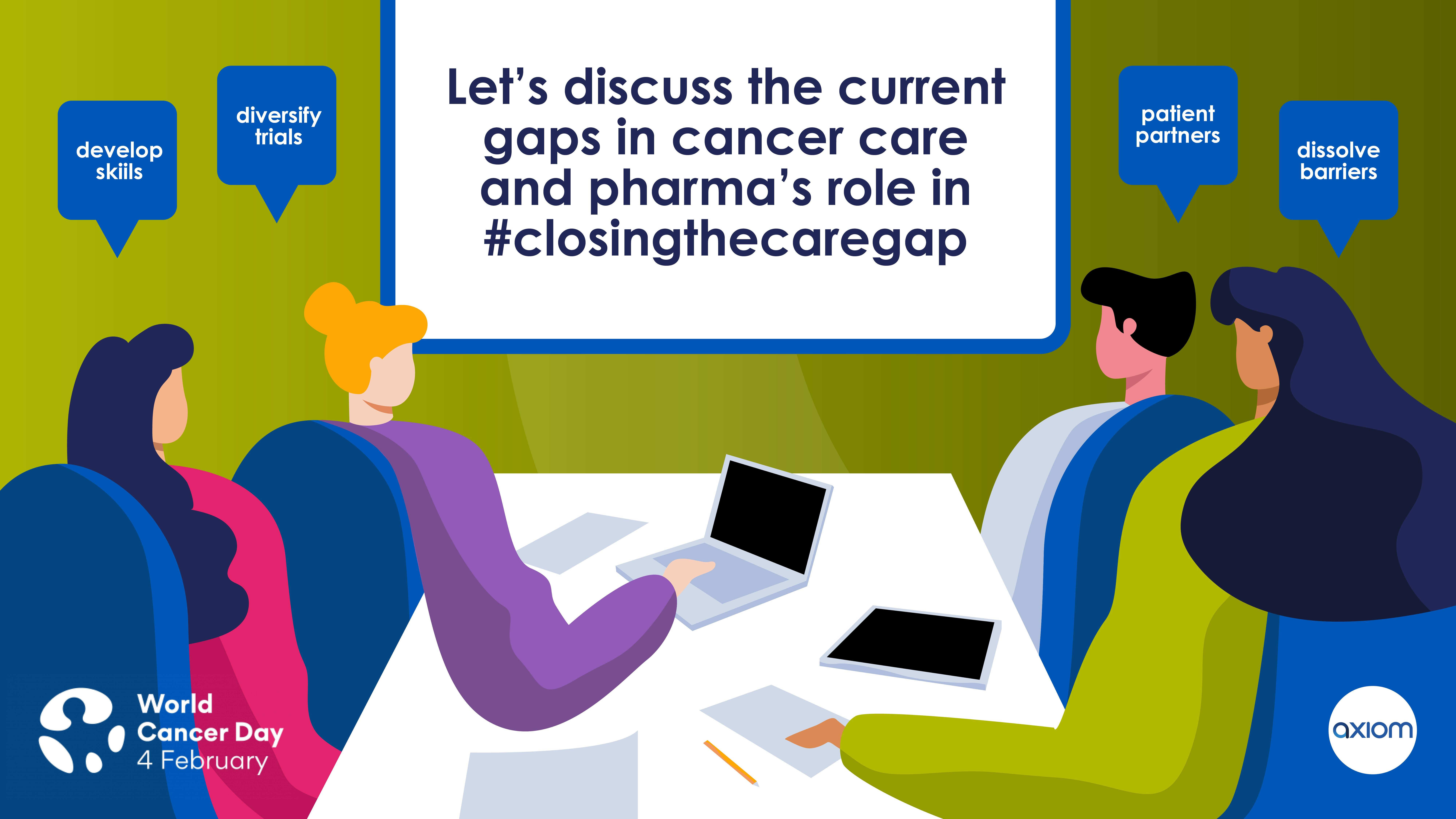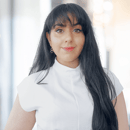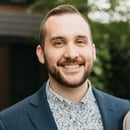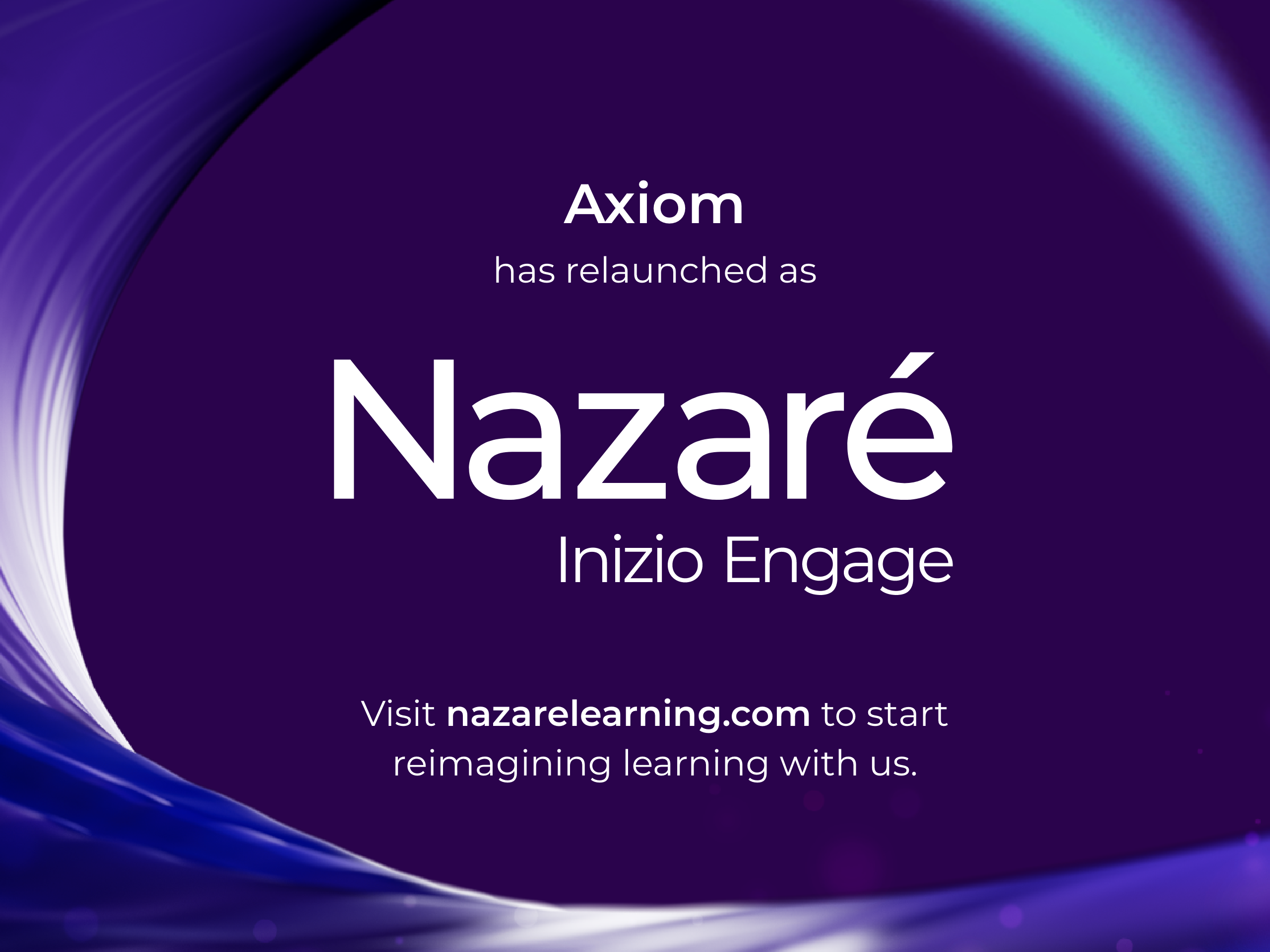
World Cancer Day 2023: Uniting voices to #closethecaregap
World Cancer Day, 4 February, is a world-uniting initiative led by the Union for International Cancer Control (UICC).
For 2022–2024, the focus of World Cancer Day is about closing the care gap. In 2023, the theme is uniting voices and taking action.
In the spirit of uniting voices, we asked four members of The Creative Engagement Group and Axiom to discuss their perspectives on the current gaps in cancer care and pharma’s role in #closingthecaregap.
Thank you to Dr James Taylor, Radiation Oncologist and Healthcare Consultant for Axiom, for his valuable insights which helped to shape this article.
First, some thoughts on trial diversity from Georgina Wiley, Associate Scientific Director and Oncology Lead at Axiom…

“Diversity in clinical trials is essential for achieving health equity.”
Georgina Wiley
There is historical disparity and underrepresentation in clinical trials that needs to be addressed.
Most clinical trials are not representative of the general population; in the UK, research published by the National Institute for Health and Care Research in 2022 showed 86% of randomised control trial participants identified as white – higher than the 81.7% of the population who are white.
In the US, almost 40% of the population are Black, Indigenous, and people of colour – and yet these groups represent only 2–16% of patients in clinical trials.
Diversity in clinical trials is important for the equitable distribution of treatment. It’s the only way to test whether a treatment works, for all who might receive it. It can also help physicians choose appropriate treatments for patients from different communities, paving the way for fairer and more tailored healthcare.
We know about some of the barriers: distrust for the healthcare system and untested treatments, lack of awareness that a clinical trial is an option, or trials requiring more time and resources than they have available.
Equal opportunities are vital, and the opportunity to be part of a clinical trial itself cannot be understated. In cancer care, clinical trials can offer life-saving or life-extending treatment that may not otherwise have been accessible to underserved patients.
Diversity in clinical trials is beneficial to pharma, scientists, doctors and, most importantly, people living with cancer. But pharma needs to lay the groundwork for diversity to be sustainably implemented. This includes providing patient and healthcare professional education, building awareness of trial recruitment inequalities, and designing trials with diversity in mind.
From trial diversity to medical innovation – a few words from Rani Khalon, Engagement Consultant & DEI Centre of Excellence Lead at The Creative Engagement Group…

“Have we really created medical innovation if our work doesn’t benefit everyone equally?”
Rani Khalon
On a global scale, we see increasing barriers to cancer care for individuals in underserved and underrepresented communities.
This is a crucial issue for the cancer care sector and society at large. Those underserved communities are the global majority. The disparities they face are detrimental to us all.
There are currently millions of people not benefitting equally from cancer care.
One contributing factor is a lack of trust that medical teams are actively seeking to understand them – losing valuable knowledge that creates the difference between life and death.
Another factor is the need for healthcare professional training and education to recognise the social differences that lead to underdiagnosis and worse treatment outcomes.
How can we pride ourselves on creating the best solutions and treatments when they are not helping everyone? Have we really created medical innovation if our work doesn’t benefit everyone equally? In addition, how can we sincerely build trust with minority groups if we cannot sustain diverse talent in healthcare?
What seems like strain or conflict in daily interactions is actually a multi-trillion dollar issue – one that is hindering oncology from creating the global impact it should.
How can we work to solve this issue? It starts with building trust through sincere and functional patient interactions.
We also need to address bias in the system and there are many ways to do this:
-
Reconfiguring the R&D process to include a range of people with diverse experience/insight/perspectives, setting the foundation for stronger intel that will serve more communities
-
Diversifying the voices in patient advocacy groups, through an accessible joining process and invitation to share views
-
Ensuring a range of different life experiences in decision-making roles within the healthcare and pharma sector.
Only when we address the lack of trust – on both sides of the cancer care continuum – can we begin to dissolve barriers and close the care gap.
Next, some reflections on healthcare data from Shawn Jordan, Scientific Strategy Director at Axiom…

“There is a growing web of information forming around patients, particularly those with access to new technology.”
Shawn Jordan
A flood of information in and from the healthcare system has created one of the biggest gaps in cancer care today.
Existing networks of information are noisy and fragmented, leading to difficulty turning information into insights that support healthcare communities. For example, as the pace of clinical development quickens, physicians can remain underinformed about new treatment approaches or lack the means to access these options for patients.
Moreover, there is a growing web of information forming around patients, particularly those with access to new technology. Patients hold increasingly detailed and readily available biometric data from smart devices, at-home DNA tests, online medical information and consultation apps.
Dr James Taylor, a Radiation Oncologist based in the US, described the challenge well: “I think patients feel more helpless than ever, despite having access to greater levels of information.”
Often, patients approach healthcare providers with more information than they – or the physician – can use effectively. Plus, the overload is getter bigger: if physicians today balk at the idea of patients handing them printouts from WebMD, how will they respond as patient-driven insights become more legitimate by communally-accepted standards?
The challenge at hand hinges on the way information moves between patients and physicians, as well as how it is validated, considered, and adapted to individual needs.
The worry is that patients and physicians can become exhausted by mountains of information and spend undue time trying to make sense of it – or give up and revert to traditional approaches.
Physicians must find ways to integrate information from myriad channels and use it to inform coherent treatment strategies. As Dr Taylor puts it: “Patients can feel comfortable and empowered to ask questions that ultimately may contribute to improvements in their care.”
Hearing the need to cut through the noise and deepen the connection between patient and provider helps us open our eyes to the possibilities. New tools that make sense of complex data hold the promise of freeing physicians’ time and attention, to partner with the people living with cancer in front of them.
Dr Taylor expressed his interest in such developments: “I would love pharma to reach out…[and] help develop digital assets that improve the flow of information from the clinic to the patient. I believe that by working directly together, the challenge of appropriate and stage-specific information delivered to the patient when they need it can be easily accomplished.”
Finally, the behavioural science perspective from Andrea Dzalto, Behavioural Science Consultant at The Creative Engagement Group…

“Behavioural science can help to bridge the cancer and health communication gap by educating and engaging individuals and communities.”
Andrea Džalto
Now that we are having more conversations about health equity, it’s important to address the role of health literacy.
Health literacy is about how well patients understand their health and are in control of it. We shouldn’t underestimate how significant this is for patient-centricity in pharma.
For people living with cancer to make well-informed decisions about their health and treatment, they must develop the skills to locate the right information and comprehend it.
According to the National Assessment of Adult Literacy, 36% of adults in the US have only ‘basic’ or ‘below-basic’ health literacy. The European Health Literacy Survey conducted across 8 countries found on average 12% had ‘insufficient’ health literacy and about 1 in 2 had ‘limited’ health literacy.
Unsurprisingly, health illiteracy figures are even higher for those who come from lower socio-economic backgrounds, who are elderly and/or non-white.
In cancer care, a patients’ poorer health literacy adversely limits their understanding of cancer screening and symptoms to significantly affect the stage at which they’re diagnosed.
Health literacy in cancer care will require collaboration from many different sectors. The good news is, there are many ways we can improve the health literacy of people living with cancer.
A huge piece of the puzzle is behavioural science. Studies have found adequate health literacy skills led to positive health behaviour changes, like increasing cervical screening, creating earlier detection and better outcomes.
Behavioural science can help to close the care gap by applying theories from psychology to better educate individuals and communities, creating effective communications and tactics to enable the biggest outreach.
Pharma has a powerful influence to improve health literacy globally for cancer care, and a responsibility to educate patients on their health so they can give fully informed consent to treatments. So, how can pharma use behavioural science?
As behavioural scientists, we work directly with pharma to inform and develop outreach initiatives – as well as training programmes for healthcare professionals to increase their understanding of health behaviour change and use this in consultations to help patients.
Four colleagues, four perspectives on how we can close the care gap in oncology. Thank you for reading about what they had to say.
This World Cancer Day, we are as dedicated as ever to collaborating with our pharma clients with the shared ambition of making healthcare equality a reality.
If you would like to find out more on how we can partner with you please contact rani.khalon@forty1.tceg.com.





